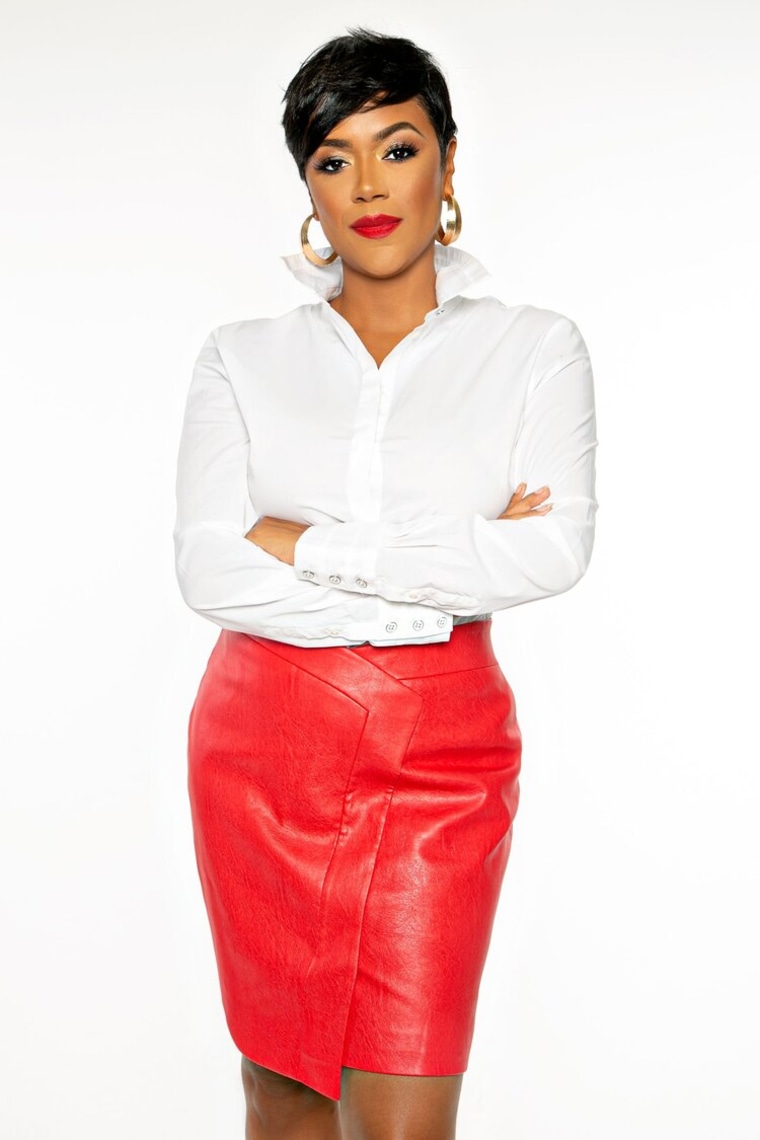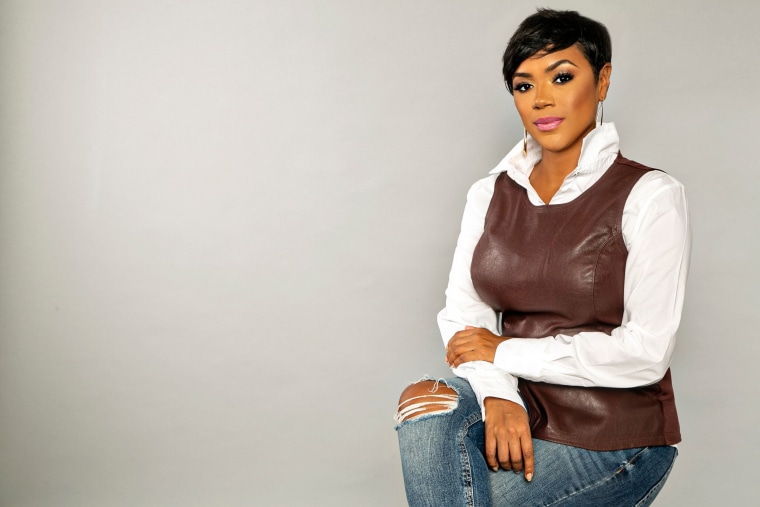Whenever I talk to Tiffany Cross, it’s usually Saturday morning, before the sun has even had a chance to rise. But on a recent afternoon, Tiffany is alert as ever, revealing the same candor she comes to the table with every weekend on her newly-minted MSNBC show, “The Cross Connection.”
So when I gave Tiffany a call, I was intrigued, but not surprised, to hear the same vibrant and fiery voice on the other end. That is the essence of working as a producer for Tiffany ― she is boldly and unapologetically herself.
But that authenticity was hard-earned. She began her TV career on the flipside of the desk, as an associate producer for CNN, an experience that would challenge what she was willing and not willing to accept in her professional life.
Her two decades of experience spans newsrooms, campaigns, policy and most recently as a resident fellow at Harvard Kennedy School’s Institute of Politics. She is also the author of “Say it Louder: Black Voters, White Narratives, and Saving Our Democracy.”

Tiffany and I chatted about her Know Your Value moment, her best career advice to a younger generation of Black women, and how to bring the country’s new rising majority of people of color to the conversation.
Below is our interview, which has been edited for brevity and clarity.
NATALIE: I want to ask you about how your year has been. You had a massive career accomplishment in 2020, going from being a commentator, to a guest host and now host of your own show ― all in the middle of the pandemic. What has that been like for you?
TIFFANY: It's been really exciting. I think there's something to be said that [MSNBC’s] Joy Reid came into this role when the Trump Administration was coming in. Now I'm coming into this role when the Trump administration is exiting, and the Biden-Harris administration is coming in.
It feels like a very unique moment to bear witness to the historic events happening at this time. The country is dealing with violent insurrectionists, but also, I think the country will get a unique lens into a different part of Black America. Americans learned more about their fellow countrymen when Obama came into office, and now I think it will be a different scope having a Black woman as vice president. I feel honored to be a part of the team that will bear witness to that.
NATALIE: Looking at your career, what was your "Know Your Value" moment? What was an inflection point where you had to stick your neck out and advocate for yourself?
TIFFANY: There were so many. I would say that moment for me was in 2016. I had taken a break from television because I just never felt welcome in this business. People were terrible to me. I mean, like awful. Throwing tapes. I got a keyboard thrown at my head once. This was while I was an associate producer for CNN. Everyone treated me like I was a big idiot. I was in my 20s. I was so grateful for the opportunity to be able to work a 12-hour day, and that they would even pay me to do it. It was beyond my wildest dream at that time.
And looking back, life has put my dreams to shame. In 2016, after just getting battered by this industry and taking a break from it, working on the communication side, I just realized that I was going to be my own narrator. I was going to write my own narrative, and I wasn't going to be so grateful for the opportunity. I was going to create opportunities. I started my own business at that point: a news platform and a startup company called The Beat DC.
But before that, I never felt like mine was a voice that deserved to be heard. I felt like this on-air life was just for somebody else, and certainly not for people who look like me. At that moment, I was like, "Damn I raised, over a million dollars. I hired and managed the staff. I sat across from billionaires and talked to them real regular. I told them this is the deal. It made me feel like I can do anything.
NATALIE: I was really struck by something you said previously, that you have a commitment to always being your authentic self on-air. What exactly does that mean for you? When did you actually learn who that authentic self was?
TIFFANY: I love that question. I think I started to be more comfortable being my authentic self when I was in my mid-30s. I think for so much of my career, and for a lot of Black women, quite frankly, you're taught to chase that white gaze and the approval of your white colleagues.
A precise moment where I decided not to do that is when I had hired someone to do social media for my company, and on a post, she tweeted, "So check dat out." It was the very Black colloquial way that we speak amongst each other, and she was not Black. I just felt like, “wow, so many people are trying to sound like us.” Why am I twisting myself and not trying to sound like them?
It was a moment where I felt like this is why there's a disconnect between the news and the rising majority of this country. Because not only are they talking about things that are not relevant and centering whiteness in everything, but they're also speaking in a way that is inauthentic but still stealing our colloquial communication. When people see me on the screen, I want them to feel like they know me and that they can connect with me, and that they're as much a part of the conversation as the guests that we book on set.
NATALIE: How do you view your responsibility to incorporate the new rising majority into the show?
TIFFANY: It is my chief responsibility. It's in the mission of the show. Black people have done so much for this country and have gone unrecognized for so long. We also have to recognize that the country has not been very kind to any community of color. I think in these past few years, it's not that the media has opened up and said, "You know what? Our bad guys. You're welcome."
Instead, it's that we've democratized the process by saying, "If you don't include us, we will go elsewhere." It's kind of scary that we're at this moment where the entire broadcast news industry is really beholden to this newer, younger generation because, in a digital space, people might start turning off the TV if you don't start speaking directly to them.
NATALIE: Every weekend, there will be young Black girls who will see you on TV, see themselves in you, and say, "I can do that too." What advice do you have for them?
TIFFANY: Obviously, that's a very humbling thing to think about and say. I want to be careful with the advice because I would see people and think that if I mimic their lives, I should land where they land. I had to learn to chart my own course because people have different coping skills, experiences, and personalities. So, my advice to young Black women is to name yourself, chart your own course, write your own narrative and not to let anyone deny you.
NATALIE: Was there anyone that served as that person for you?
TIFFANY: There were so many people. Some I knew personally and some people I didn't know. I remember Black Enterprise did this whole article on Black women CEOs. I read that article, and every time, I would get upset about something, I would always ask myself, Is this the behavior of a CEO? Would the women I just read about behave that way? I didn't know them personally, but just by their sheer existence, they served as a role model and a guide for me. I would always say, conduct yourself for the job you want, not for the job you have.
NATALIE: Black employees make up only 7 percent of newsroom staff. And representation matters. To quote Alicia Garza from a discussion she with NBC BLK about the Biden administration, we also need to "move beyond the symbols of representation,” and really dive into the values and the priorities being represented." What do you think needs to be done in newsrooms moving forward?
TIFFANY: They have to hire more people of color. The newsroom staff needs to start reflecting America. What Cesar Conde is doing at NBCUniversal News Group is really aggressive and timely. I think it puts the NBC family light years ahead of the competition. I've said this before, you have some networks still treating race as the side story, when it's the main story. People need to get used to the idea that we are not the potato, we are the steak.
Tiffany Cross is the host of “The Cross Connection” on MSNBC airing Saturdays from 10A-12P EST, and author of “Say it Louder: Black Voters, White Narratives, and Saving Our Democracy.”
Natalie Johnson is a segment producer for “The Cross Connection” and “The Sunday Show” and an illustrator from Brooklyn, New York. Follow her on Twitter @nataliejohnsonm.
